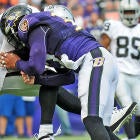If you paid attention to professional football during the 2017 season, you could not go more than a few days without hearing the term "RPO." You surely know by now that RPO stands for run-pass option, a type of play that seems to be taking over the league more and more with each passing day.
It's easy to see why: the RPO allows a quarterback to make a decision on whether to hand the ball off to a running back or pull it back and make a quick throw, based on how the defense reacts. It's essentially a cousin of the read-option runs that swept through the league in the early 2010s, only it allows for the additional option of a pass, putting even more pressure on the defense to play perfect assignment football.
It's quickly become accepted in and around the league that the RPO should be even more widely used than it already is (you can thank the success of the Chiefs and Eagles' offenses last year for that), and there are stories from several training camps about how teams are indeed incorporating it more into their offensive schemes.
But there's at least one defender who thinks the RPO will just as quickly phase itself out of the league. Baltimore Ravens safety Eric Weddle doesn't think it's any more than a fad that we won't be talking about at all by, say, 2023. "I think in five years, it's going to be out," Weddle said, per ESPN.com. "I think it's just another phase."
Weddle drew a parallel to another innovation that took over the league for a short time, starting just about 10 years ago, but that quickly went by the wayside. "It's just like the Wildcat, and the quarterback run game, yada, yada, yada," Weddle said. "Teams that run the ball and take shots are usually the hard teams to beat."
Weddle is partially correct there. The Wildcat did quickly phase out of the league. But it's been shown by several studies that running the ball does not necessarily have a strong correlation to winning. And the RPO actually does allow teams to take even more shots than they might usually take, because the quarterback can audible out of a running play and decide to pass after the ball has been snapped.
That's the whole key with the RPO, and why it's different than, say, the Wildcat. The Wildcat was largely about disguising who would run the ball, and if and when a pass was thrown, it was being thrown by a running back. The RPO keeps teams guessing about whether the play will be a run or a pass.
If it's a run, there's a disguise as to whether it will be a running back or quarterback running the ball. And if the quarterback pulls the ball out, there's a question as to whether he will run or pass. It's essentially combining a read-option run with a play-action pass, so that the defense has to defend against every possible play, even if the defenders read their keys correctly.
There is of course a chance that Weddle is 100 percent correct and there is a perfect way to defend RPOs that will cause them to go away fairly soon, but right now it seems much more sustainable than previous offensive innovations.
![[object Object] Logo](https://sportshub.cbsistatic.com/i/2020/04/22/e9ceb731-8b3f-4c60-98fe-090ab66a2997/screen-shot-2020-04-22-at-11-04-56-am.png)


















